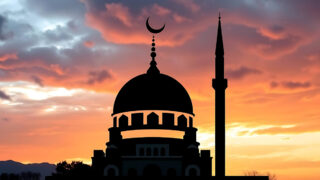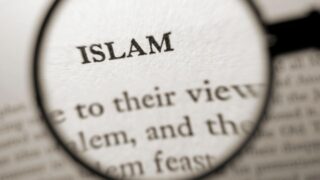Sport plays a prominent role in society. But more often than not it is the personalities that feature decisively in the lives of the spectators. In that case they can either be a good influence or bad one.
A few days ago, soccer star Lamin Conte of Wahda Club in the United Arab Emirates embraced Islam. He said: “What pushed me to Islam is the gathering of players at one particular time to perform prayers, and the way the players and club officials have treated me. I was encouraged to ask for some books in English about Islam from my colleagues, Adil Matar and Ibrahim Saif. This helped improve the picture the West has drawn about Islam in my mind. I was also aware of the behavior of my Senegalese colleague Bori Lah.”
Conte of Sierra Leone, who is now called Mohammad, said that footballers and sports personalities take on a great responsibility in refuting the charges that the Western media has directed at Islam.
Like Mohammad Conte, Egyptian Ahli club player Felix Abouagi of Ghana was excited when he saw his colleagues fasting during Ramadan and playing on the pitch with the same seriousness, and without complaining of inadequate nutrition. He said that what drew his attention to Islam was “the prostration of thanks” some players did when they scored goals.
The Ghanaian player embraced Islam, has named himself Ahmed and is now the proud father of Ashraf. Abouagi and his football colleagues are regular prayers at a well-known mosque in Dokki. He admits that at first, he was surprised when he saw people praying in rows and sitting on the ground when praying in the street.
Then there is Mohammad Rashwan, the renowned Egyptian Olympic star. In the final match of heavyweight judo competition at the 1984 Los Angeles Olympic Games, he declined to take advantage of his competitor’s knee injury (the Japanese, Yamishitta) by avoiding kicking him on that knee. The Japanese hero won the gold medal, while Rashwan received only silver. Yamishitta kissed the Egyptian player, held his hand high and toured him around the hall where spectators shouted “Mohammad, Mohammad.” Regarded as the best judo player ever, he still hailed Rashwan’s upright character and invited him to visit Japan. There, the Egyptian player found how the Japanese welcomed and appreciated him. He married a Japanese woman after she embraced Islam. Moreover, the Japanese began to read about Islam after they noticed Mohammad’s behaviour. A large number of them embraced Islam because of the player’s good example.
Brazilian coach of the Moroccan royal army club, Fouzi Faria, who led the Moroccan squad to the finals of the 1986 World Cup in Mexico, was impressed by the behaviour of some of his team players who insisted on performing their prayers on time and refused to eat in Ramadan. Fouze was surprised because despite their thirst and hunger, they were the most disciplined on the field, the best in terms of behaviour and enjoyed their colleagues’ love and appreciation. Asking one of them what the secret was, the player replied: “I try to abide by the rulings of Islam because our religion is based on good treatment.” The Brazilian coach read a lot about Islam before he converted to Islam and called himself al-Mahdi.
In some cases it is when sports personalities speak that they draw attention. Ahmed Hassan, football champion of the Egypt squad, Kugali club in Turkey and formerly of Ismalia Club, was asked about his ambitions in life. He replied: “I wish that my behaviour, the pattern of my life and my duties take me to heaven.” This came in an interview by a prominent sports magazine. This reply, for sure, will raise the interest of many youths. Let’s hope that his reply will be a model example to many who already regard football personalities as their mentors.
In other parts of the Arab world, attention is drawn to teams gathering before matches to recite the Holy Quran and pray to God to give them success in the match. The replay by international sports channels of a goal scored by Saudi player Said al-Uwayran in his country’s match against Belgium in the 1994 World Cup in the United States, may place in the mind of spectators a picture of Saudi Arabia as a country containing Islamic shrines. Although others may think of it as an oil-rich state and not much else, the general conception from this image can leave one not normally presented by the media. This is similar to Iran’s win against the USA in the 1998 World Cup in France, when politicians claimed that achieving victory with America in other fields is also possible.
Ali and Islam
We can probably say that heavyweight boxer Mohamed Ali Clay has been a great ambassador to Islam. He was elected by different sports and media organizations as the best sportsman in the 20th century. The famous boxer actually converted to Islam while he was under the eyes of the world winning fights throughout the early part of his career. Activities other than boxing were also witnessed by the world: his support for the spread of Islam in America and out with it, his visits and activities at Islamic centers in different states, raising funds for these centers and support to poor communities.
The world loved Mohammad Ali, as the world’s heavyweight champion developed boxing from a violent sport to an artistic one. He would ‘float like a butterfly and sting like a bee.’ But the world expresses its sympathy with Ali, who now suffers from Parkinson Disease and unfortunately due to boxing. His name alone conjures up in the minds of many the obvious question: Why did Ali convert to Islam?
Egyptian swimmer Rania Elwani, who trained in the United States for five years, said she was much impressed by the people’s interest in Islam. “ I performed prayers before quitting swimming and wearing hijab,” she said. Elwani continues to say that she entered into several debates on Islam including accusations against it, of which the ugliest is that it is a religion that calls for killing, terrorism and destruction of civilization. But the search by some Americans for the truth has lead them eventually to embrace Islam and preach it.
British Muslim boxer Nassim Hamid, who often prostrates to thank God after winning fights, also shows a similarity to Mohammad Ali. Common practice is that the winning boxer jumps up for joy or is carried by his supporters. But Nassim Hamid, the world’s lightweight champion who always wins by a knockout, draws much interest by his prostration of thanks.
Impact of Names
A number of sports personalities affect spectator’s perception simply by their Arabic names, like Mohammad, Mustafa, Ali, Hassan or Noreddin.
In German football league matches, Turkish-born player Mohammad Shul, star of the German league and one of the top five clubs in footballing history (Bayern Munich) performs well. His name certainly draws the interest of German people, especially since he is a star of the German national team and is polite on the field. He enjoys wide popularity. The name Mohammad is a symbol of Islam, and this player’s behaviour is a symbol of the religion.
A colleague of Shul in Bayern Munich is Bosnian Muslim player Hassan Saleh Hamiditch, who has drawn sympathy from the German people towards his fellow countrymen during the war with Serbia. His name is a symbol for football fans worldwide who follow the European league. He raises in the spectator’s mind the oppression of Muslim minorities in Europe.
Zein al-Din Zeidan, star of the French squad and Italian club Juventus, who is of Algerian origin, influenced the issue of illegal immigrants in France and policies adopted by the right to deport Arabs and immigrants from France. Zein al-Din, the French people’s most-loved-person, was instrumental in changing this policy. The slogan ‘France for all,’ and ‘France is the melting pot of all cultures,’ was voiced, despite the fact that Zein al-Din himself may not have an inkling what is going on in Arab countries. But his name alone is a symbol that Arabs and Muslims have a unique potential.
The name of his countryman Ali bin Arbia, star of Paris Saint Germain club, remains a symbol to Islam. This name is repeated daily to football fans in France and Europe. He is a focus in the media because of his abilities as a striker. The name of his fellow citizen, Rabbah Mager, star of the Portuguese Porto club, is repeated in European championships because of his goals. The same applies to Moroccan player Mustafa Haji, who plays for English club Coventry City. He is a distinguished player and plays for his country’s national team. He won the title of Africa’s Best Sportsman in 1998. This name, Mustafa, raises in the mind of spectators and readers a modified picture of Islam.
The African footballer, Ismail Coibali of Mali, who plays for the German club Freiburg, indicates to spectators that Islam is a universal religion. Some Muslim sports persons who refuse to drink alcohol, be pictured naked or insist on fasting are considered interesting personalities to their colleagues and fans.
Taking an interest in political causes
The presence of Arab players in European clubs sometimes draws attention towards the Arab-Israeli struggle. For example, players of the Belgian club “FC Bruges” were surprised by the captivation of the Israeli media of their Egyptian goalkeeper Nadir al-Sayed. He was asked his opinion on the issue and he replied by claiming his undivided support to the Palestinians. They were interested by al-Sayed performing Asr prayer on the pitch during halftime in their European league match.
Egyptian footballer Hani Ramzi passed through a similar situation four years ago. He was playing for German club Verder Bremn, which traveled to Israel to play a European league match. He was followed by television cameras to ask about the oppression of Christians in Egypt. He replied: “Don’t think that what you do against the Palestinians we face in Egypt because of religion. In Egypt, Muslims and Christians live in harmony and refuse to accept the ugly massacres you carry out against our brothers in Palestine.” He added, “Egyptian Christians will only enter Palestine with Muslims after liberating al-Aqsa mosque.”
Reactions like those of Hani Ramzi and Nadir al-Sayed have caused a stir in Belgian and German media. They also refute the accusation that Copts are oppressed in Egypt and show the insistence by Arabs, Muslims and Christians on liberating Palestine from the desecration of the Israelis.
Sports personalities who are followed by children, youths and adults can affect peoples’ attitudes negatively or positively through their behaviour. Those personalities should recognize this role.
The Iranian national football team offered a positive sporting example on Islam and Iran after the Islamic Revolution through the behaviour of its players who offered gifts to their American competitors during their encounter in the world cup.
Sports personalities certainly have an influence. One hopes that they use it for the good of Muslims, the spread of Islam and winning European and American public opinion in support of Muslim and Arab rights? Sports personalities should have a positive impact.
By Abul Maati Zaki


















